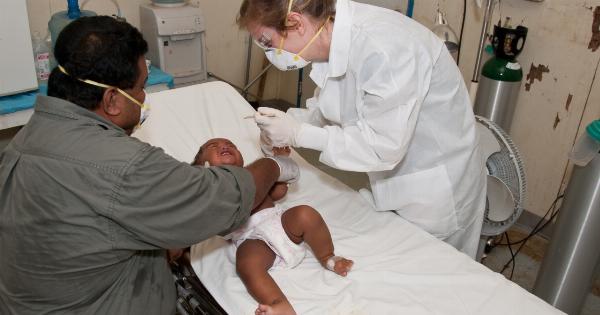Babies are one of the most vulnerable segments of our society due to their vulnerability to get sick frequently. Babies have an immature immune system, which makes them more susceptible to infections and illnesses.
Studies have shown that babies tend to get sick more often as compared to older children and adults. This article will discuss why babies get sick so often, and what factors contribute to their poor immunity.
Immature Immune System
The primary reason why babies get sick so often is because of their immature immune system. Babies are born with an underdeveloped immune system, which means their body is not capable of fighting off infections and diseases as efficiently as adults.
In the first few months of life, babies rely on their mother’s antibodies to protect them from infections. However, as these antibodies begin to disappear, babies become more vulnerable to infections and illnesses. It can take up to 2 – 3 years for a baby’s immune system to fully mature.
Exposure to Germs
Babies are also more prone to illnesses because they are exposed to germs more frequently. As babies explore their surroundings, they tend to put everything in their mouths, including toys, fingers, and even dirt.
This exposes them to a variety of bacteria and viruses that can cause infections. Additionally, because babies have weaker immune systems, they are more likely to get sick from these germs as compared to older children and adults.
Daycare and School
As babies grow older and start attending daycare or school, their exposure to germs increases, which can lead to more frequent illnesses.
Daycare and school settings are breeding grounds for viruses and bacteria, as there are often many children playing in close proximity to each other. Additionally, children in daycare and school are often too young to understand proper hygiene practices, which makes it more challenging to prevent the spread of infections.
Breastfeeding Vs. Formula Feeding
Studies have shown that breastfed babies are less likely to get sick as compared to formula-fed babies. Breast milk is rich in antibodies that helps protect babies against infections and illnesses.
Additionally, breast milk also contains prebiotics that support the growth of healthy bacteria in the baby’s gut, which can further boost their immunity. Formula-fed babies, on the other hand, miss out on these protective benefits.
Environmental Factors
Environmental factors can also play a role in a baby’s susceptibility to illness. For example, air pollution and secondhand smoke exposure have been linked to an increased risk of respiratory infections in babies.
Additionally, living in crowded and unsanitary conditions can also increase the risk of infections.
Vaccinations
Vaccinations are an essential tool in protecting babies against infectious diseases. Vaccinations work by stimulating the immune system to produce antibodies against specific pathogens.
This means that if a baby is exposed to a particular virus or bacteria, their immune system will be better equipped to fight it off. Vaccines have been successful in reducing the incidence of many infectious diseases, such as measles, mumps, and rubella.
Conclusion
In conclusion, it is not uncommon for babies to get sick frequently due to their underdeveloped immune system and exposure to germs.
However, there are several ways to reduce a baby’s risk of illness, such as breastfeeding, vaccinations, and proper hygiene practices. By taking these precautions, parents can help protect their babies from infections and promote their overall health and wellbeing.































